The short answer to this question is “basically, yes.” Unlike so many other “people” foods, raspberries are safe for dogs to eat.
However, just because dogs can typically eat a few raspberries without any ill effect doesn’t always mean they should.
As a conscientious dog owner who wants to make sure your pup stays healthy and happy, it is important to know the benefits and drawbacks of feeding your dogs raspberries.
For example, should raspberries be fed only occasionally or can they be offered more frequently? How many raspberries are safe to feed in one serving? Are raspberries the best fruit choice for dogs or are there other fruits that have more to offer? Can raspberries ever be toxic to dogs?
Find out everything you need to know about dogs eating raspberries in this article.
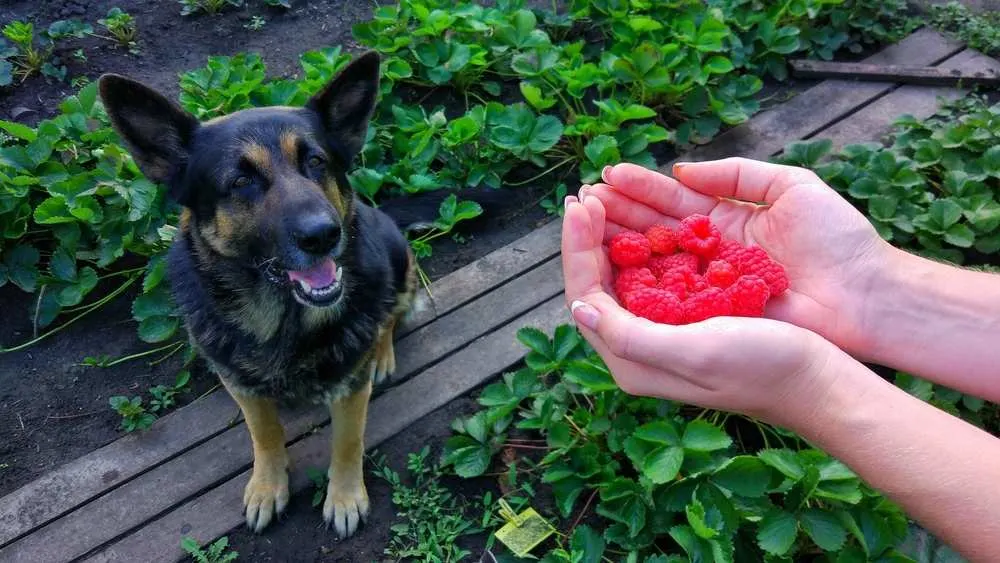
Should Dogs Eat Raspberries?
According to the American Kennel Club (AKC), raspberries are one of the fruits that are essentially safe to offer to your pup as long as you pay strict attention to quantity and frequency.
You should feed raspberries only in strict moderation: no more than one cup of raspberries at a time (and this is for large or giant breed dogs only).
Talk with your dog’s veterinarian about how much and how often to feed raspberries for your dog’s size and overall health.
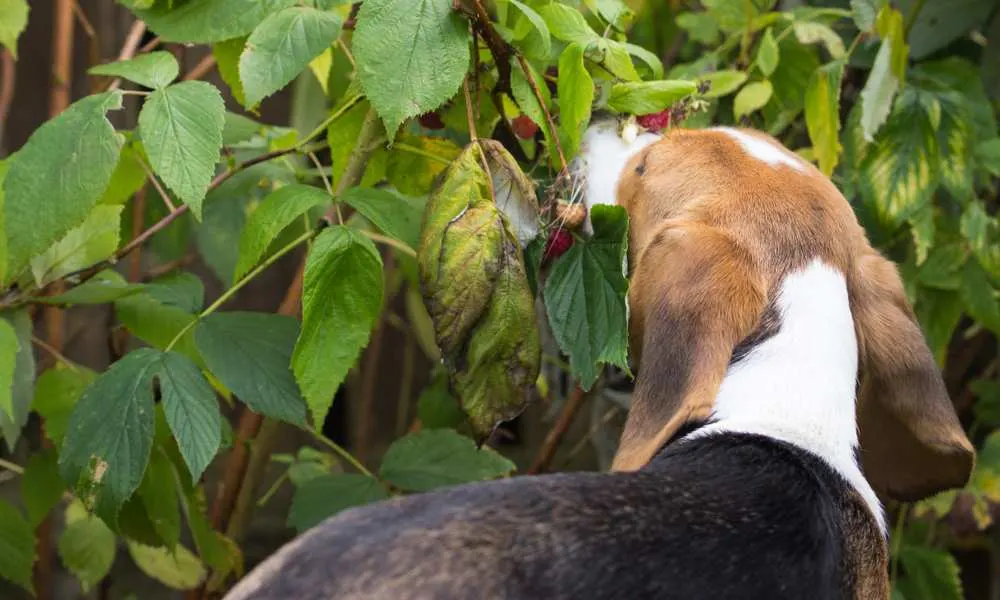
Can Dogs Eat Raspberry Leaves?
As urban farming becomes more popular, more families are choosing to grow their organic produce in a backyard garden, including fresh raspberries.
But dogs may view the backyard garden as more of a play area or treat the source and more than a few owners have discovered their dogs happily chowing down on the young raspberry plants.
Is this okay for your dog to eat?
There is nothing in the literature that says the other parts of the raspberry plant are toxic to dogs. However, it is worth noting that raspberry leaf is sometimes used as a pregnancy aid for dogs, both in inducing whelping and in treating pseudo (false) pregnancy.
If your dog is pregnant, it may not be safe for her to eat any part of the raspberry plant. Always talk with your dog’s veterinarian before feeding raspberries in any form or allowing your dog anywhere near a backyard garden where raspberries are planted.
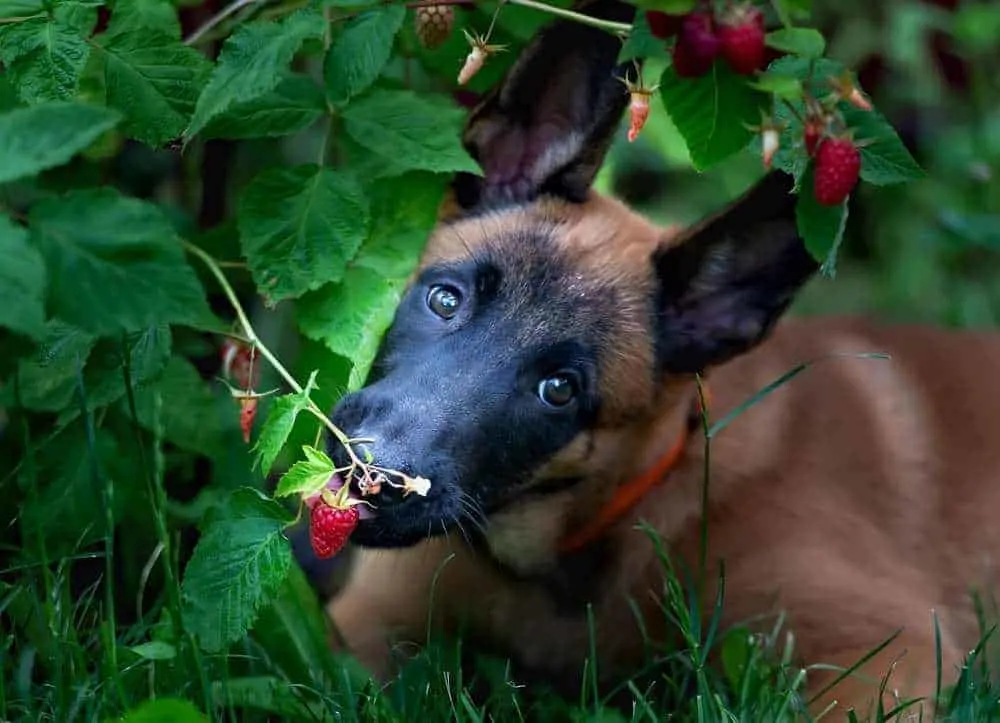
Are Raspberries Toxic To Dogs?
Given what you just read, you may wonder why there is even a question about raspberries being toxic to dogs.
There is something you need to know about raspberries that makes them different from other fruits and fresh produce.
Raspberries have some of the highest concentrations of natural xylitol of any fruits or produce.
Perhaps you have heard about xylitol, the sugar substitute that is added to many people’s foods to lower the caloric content? Xylitol is well-tolerated by people, but for dogs and other animals, it is toxic.
Xylitol is a sugar alcohol. It is found naturally in many fruits, especially berries, and other produce, including lettuce, plums, mushrooms, corn, oats, and other fruits.
Now, synthetic xylitol is not the same as naturally-occurring fruit xylitol. But if your dog eats too much of anything containing natural xylitol such as that found in raspberries, it could produce the same effects.
According to VCA Animal Hospital, the symptoms of xylitol poisoning can include these:
- Vomiting.
- Weakness.
- Lethargy.
- Lack of coordination.
- Difficulty walking.
- Tremors.
- Coma.
- Seizures.
- Hypoglycemia (low blood sugar).
- Liver failure.
- Death.
There is no antidote to xylitol poisoning and it must be treated by a veterinary professional. Often a combination of treatments is required to stabilize the blood sugar, reintroduce fluids and protect the liver.
Once the liver failure has commenced the prognosis begins to look very poor so it is vital to get your dog emergency veterinary care immediately.
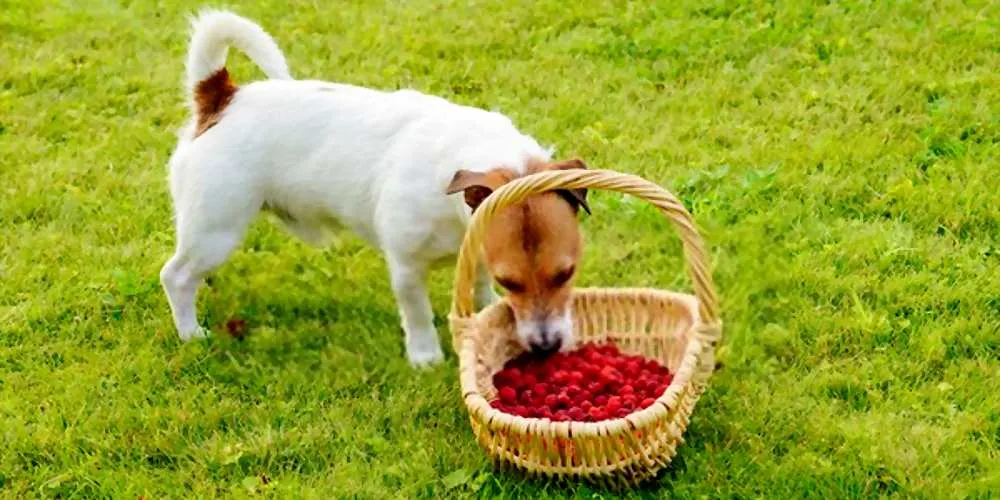
Are Raspberries Safe For Dogs?
Dogs will be dogs, as every dog owner knows. Sometimes no matter what you do to dog-proof your home, yard, and kitchen, your dog will find something you don’t want them to eat and happily gulp it down!
From that perspective, a raspberry or two is not the worst thing your dog could eat by far. Many fruits and other products contain trace amounts of natural xylitol.
Raspberries also contain some beneficial nutrients that can be healthy for dogs.
Fiber
People aren’t the only species that can benefit from insoluble dietary fiber. Raspberries, like many fruits, are naturally high in dietary fiber that can keep your dog’s gastrointestinal tract healthy and functioning properly.
Vitamin C
Vitamin C is a particularly beneficial antioxidant and vitamin that your dog needs.
While healthy dogs can make sufficient quantities naturally, Whole Dog Journal points to several research studies showing that Vitamin C is extremely beneficial in other ways.
For example, timely Vitamin C supplementation can help dogs recover from a host of viral and bacterial infections and toxic reactions, as well as cancer.
Manganese
As PetMD explains, manganese is what is called a “micro-mineral.”
This micro-mineral helps to build healthy bone and cartilage, helps your dog’s body metabolize (make use of) protein and carbohydrates from food and manufacture essential fatty acids. Dogs need to get manganese from produce or supplemental additives since meat is not a good source of this micro-mineral.
Antioxidants
Antioxidants are naturally protective against cancer and other diseases and can give your dog’s immune system a helping hand. They are also restorative in that antioxidants can replenish Vitamin E levels in your dog’s body and help rebuild damaged collagen and tissues.
Anti-inflammatory benefits
Raspberries also provide a natural anti-inflammatory effect in the body, which can be especially beneficial if your dog struggles with arthritis or any immune system condition.
So as you can see, there are some legitimate health reasons to consider adding small amounts of raspberries to your dog’s treat rotation.
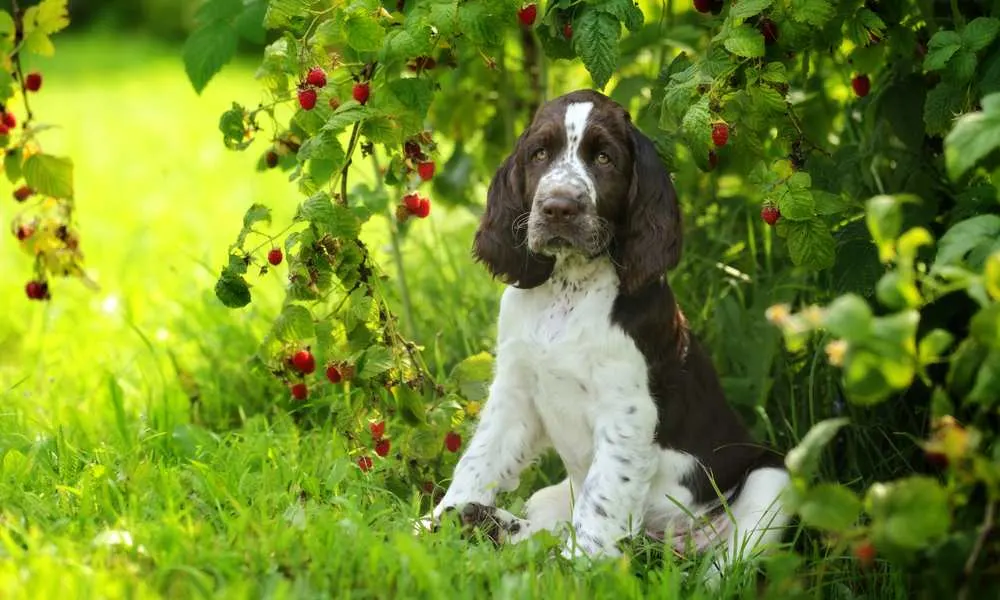
How To Feed Raspberries To Dogs?
The number of raspberries you feed to your dog must take into account your dog’s size, age, weight, and overall state of health.
When in doubt and if you have any questions, always talk with your dog’s veterinarian before offering your dog any raspberries.
There may be other berries or fruits that pose less risk and are more beneficial to your dog than raspberries can be. In this case, your veterinarian may recommend feeding these other produce types instead.
As we mentioned here earlier, feed no more than one cup of fresh raspberries to your dog at a time. But this is only for large or giant breed dogs.
If your dog is a medium-size breed, one-half cup of raspberries is the most you should offer.
For small breed dogs, you can cut that portion into a one-quarter cup of raspberries.
Always talk with your veterinarian before feeding toy or miniature breed dogs any product that contains naturally occurring xylitol. Because toy and miniature breed dogs are so small and light in weight, even a single raspberry may be poorly tolerated and produce adverse reactions.
Another thing to consider before offering your dog raspberries is overall health. If your dog has any type of issues with blood sugar (especially hypoglycemia, which many toys and miniature breed dogs are prone to), do not feed raspberries.
If your dog has been diagnosed with diabetes, never feed any sweet foods without talking with your veterinarian first.
Some dogs may have sensitivities to raspberries for a completely different reason – they are naturally very tart. The high concentration of ascorbic acid (Vitamin C) lends to the tartness of raspberries. Some dogs have more trouble digesting tart foods, especially dogs with sensitive stomach issues.
By learning all you can about which fruits and foods are safe for your dog, you can guard against the chance that your dog will encounter a no-no food and wolf it down before you can intervene.
Talking with your dog’s veterinarian to set up a regular meal and treat routine can help you identify the best, most nutritious treat foods that can add extra vitamins and minerals to your dog’s diet and also be delicious and fun to eat.
Learn More: What Can Dogs Eat? A Comprehensive List Of Dog-safe Foods

